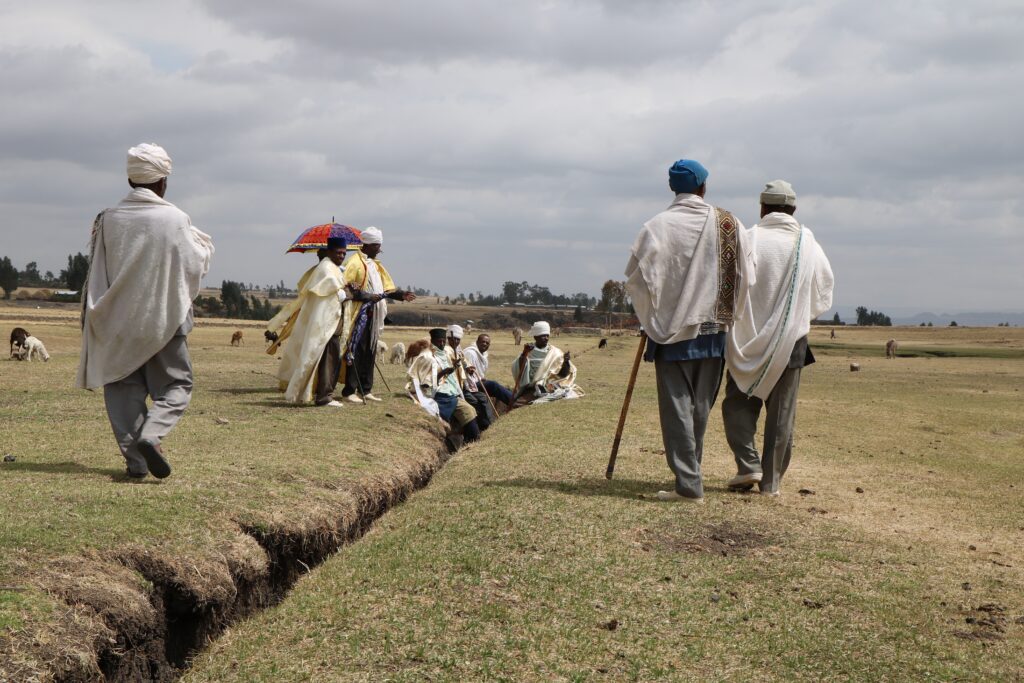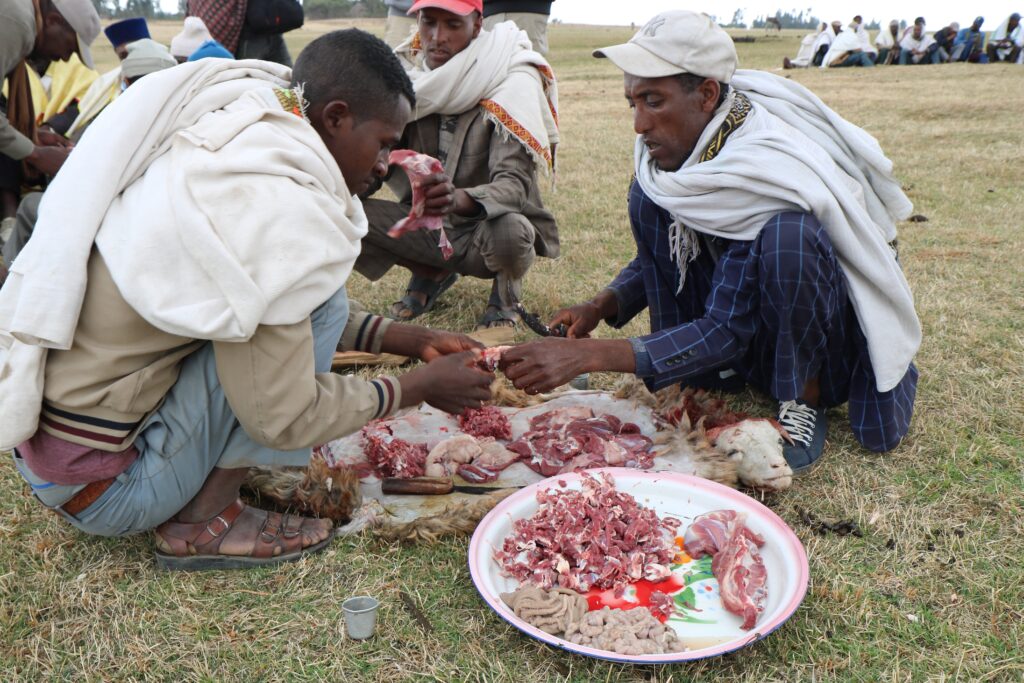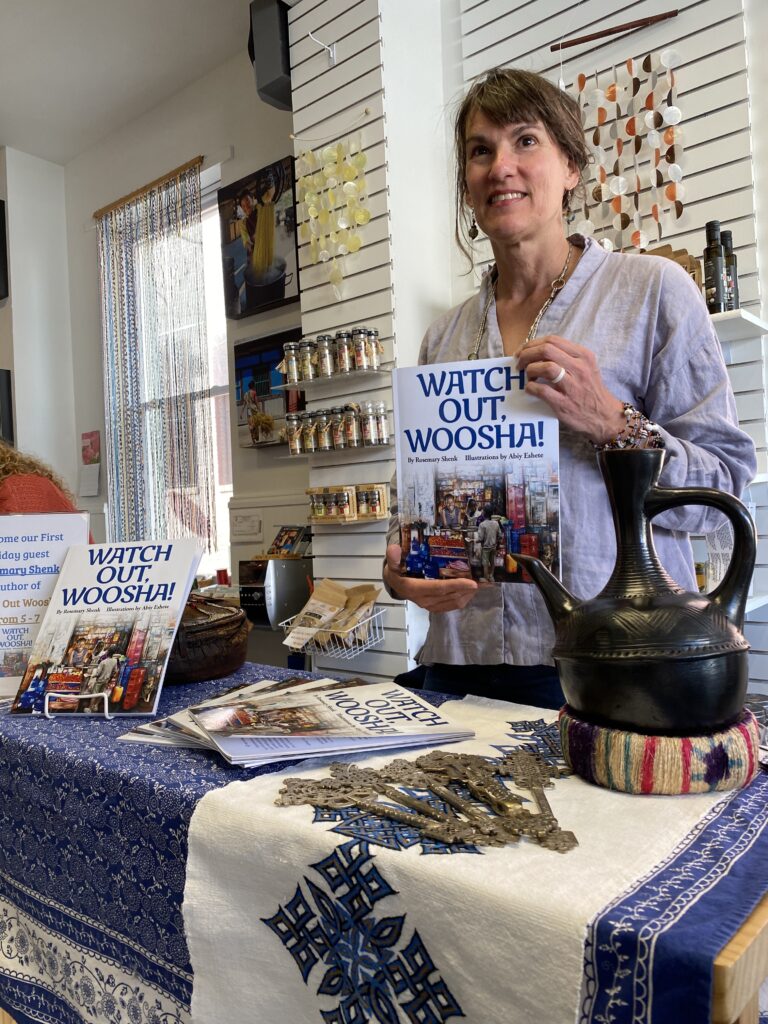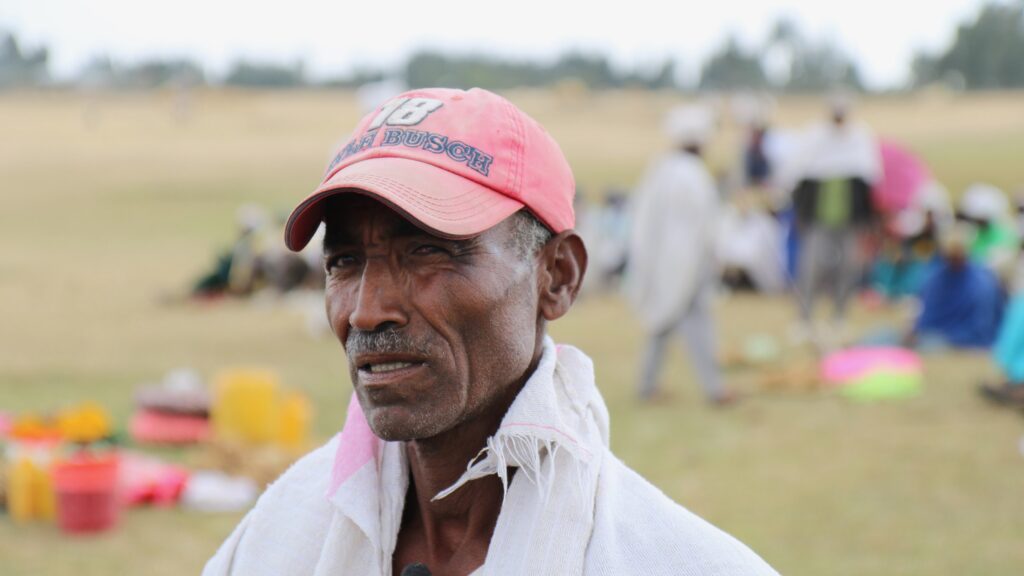
Abebe Degafu during the reconciliation ceremony where two men were forgiven for murdering his nephew.
Abebe Degefu knows the price—and the freedom—of forgiveness. He, along with his community, chose restorative justice over revenge after the murder of his nephew, Tegene Chernet.
On a cold October night in 2015, Tegene Chernet left his seven-year-old daughter at his rural village home. He walked through the darkness for a night of drinking at a bar in Anchekorer, the nearest town to his rural Amhara village. He was thirty-five years old.
As the night wore on, Tegene fell into an argument with two men he did not know. No one could reconstruct exactly what the argument was about. It turned into a fight, and, by morning, the two men had beaten Tegene to death.
Eyewitnesses identified the murderers. The two men were tried and given ten-year sentences in the Debre Birhan prison.
Revenge is one of the most powerful human motivators, responsible for blood feuds around the globe. The Amhara region in Ethiopia is no exception. If a person is killed, the victim’s family is obligated to kill someone in the offender’s family, according to a tradition called “Black Blood.” If someone chooses forgiveness over the Black Blood, he may find a woman’s dress thrown on his property, indicating that he is not man enough to avenge his family’s honor. If a man (or woman) commits a murder, they can look forward to being murdered themselves upon release from prison.
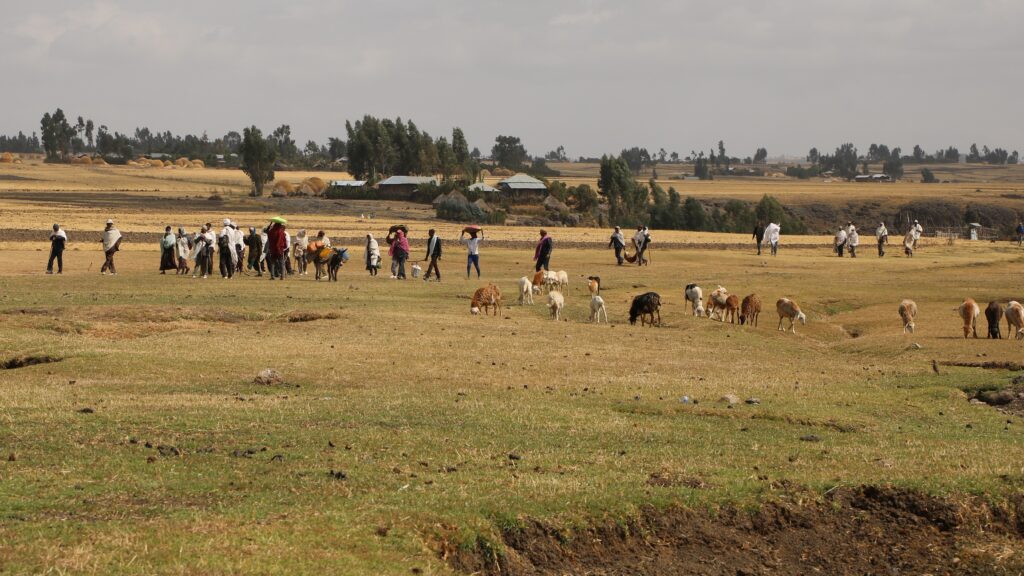
The offenders’ families cross the open field and walk toward the stream where the ceremony will take place. They carry gifts for a feast, symbols of remorse and reconciliation.
For more than twenty years, the Meserete Kristos (Mennonite) Church in Ethiopia has worked in the Amhara prisons to reduce this cycle of violence. They started with one prison in Debre Birhan and were so successful that they were invited to expand into a prison in Mehal Meda, another Amhara town.
One of my most memorable experiences as a Country Representative for MCC Ethiopia was witnessing the traditional ceremony of Sera that reconciled the families of the two men who committed the murder of Tegene Chernet, with the family of the victim.
The event occurred in a field between the two communities. It was February 2021, five years after the murder had taken place. There was a small crevice running through the field that carried a trickle of water. This tiny stream was to play a large role in the ritual taking place.
The first to arrive were the families of the two offenders. They carried a sheep, homemade bread, barley beer, and other gifts and symbols of their remorse on behalf of the two men still in prison. They would stay on their side of the rivulet of water until forgiven and invited to cross over by the victim’s family.
Next to arrive were the shimageles, or village elders. They accepted a 20,000 Ethiopian birr restitution payment on behalf of the offenders, equivalent to about $500. The mother of one of the men in prison sold her farm to help raise the money.
After about an hour of waiting, while the offenders’ families prepared themselves for what was to come, the victim’s family appeared on the opposite hillside. Missing was Tegene’s twelve-year-old daughter, deemed too young to participate in such a solemn event.
These two sides, physically separated on opposite hillsides with a stream of water in between, were once part of a close rural community. They were from the same ethnic group, attended the same church, shopped in the same market. But during the past five years, the brutal murder had left them sworn blood enemies. The nearly impossible task of bringing them back together was the role of the shimageles (village elders), the church priests, the local government peace office officials, and the Meserete Kristos prison chaplains. Would Tegene Chernet’s family accept the apology and restitution, and grant the offenders safe passage back into the community after their release? There was still the chance that they would say no and the community fabric would be torn apart forever.
The shimageles climbed the hill to meet the bereaved family and to hear their answer. They agreed to accept gumata, the apology and restitution. They agreed to forgive the offenders and their families and to move forward with Sera, the reconciliation.
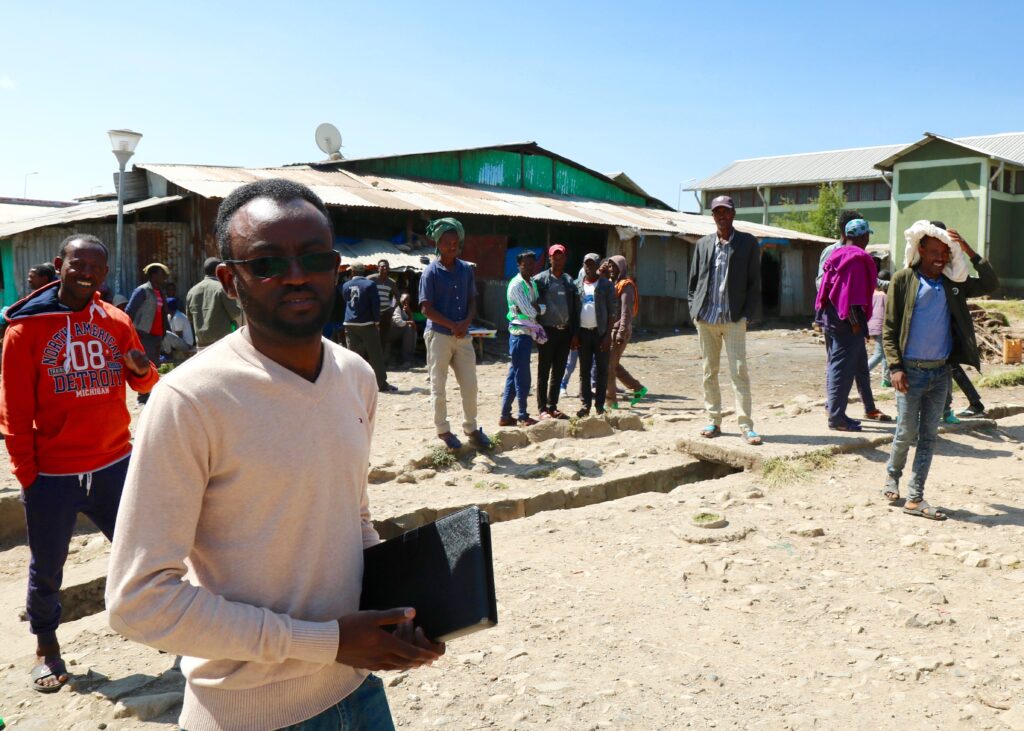
Asalifew Wolde, Peace Desk Coordinator for Meserete Kristos Church Prison Ministries, with inmates at the Debre Birhan maximum security prison in Amhara, Ethiopia, 2019.
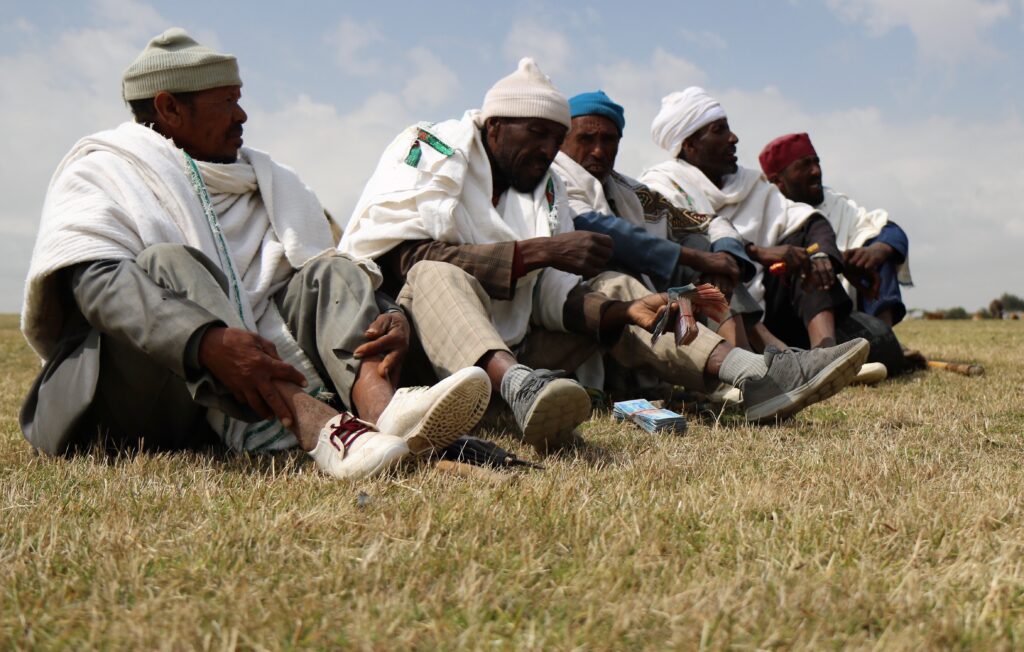
The shimageles—village elders and peace committee members—count out the payment for taking a man’s life.
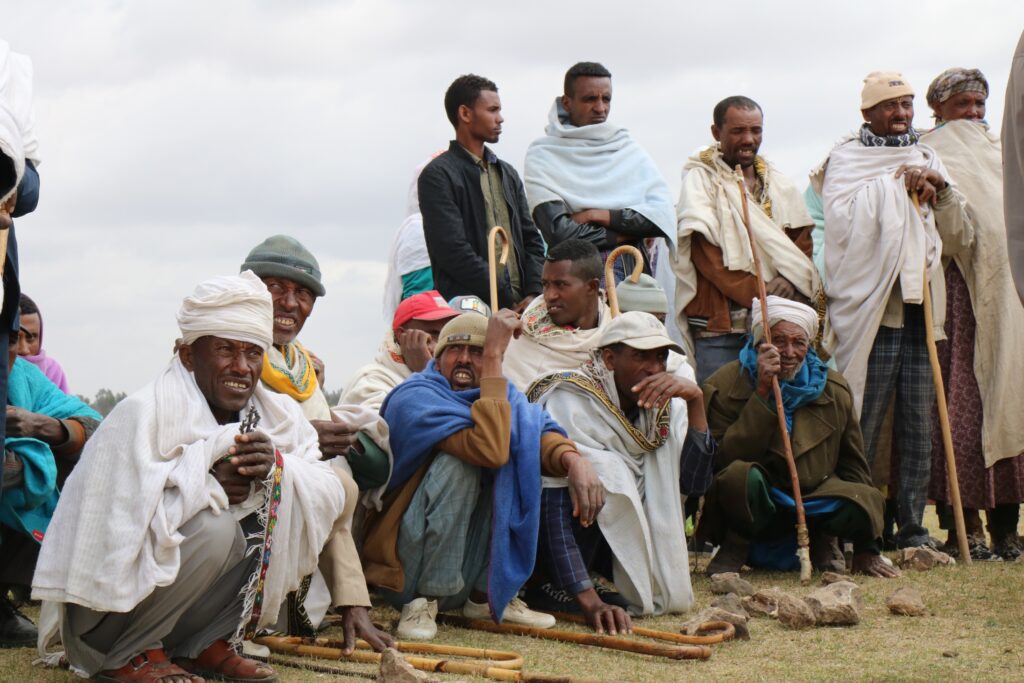
Elders from the families of the two offenders lay down stones, symbolizing the sin of murder they have been carrying on account of the two men still imprisoned.
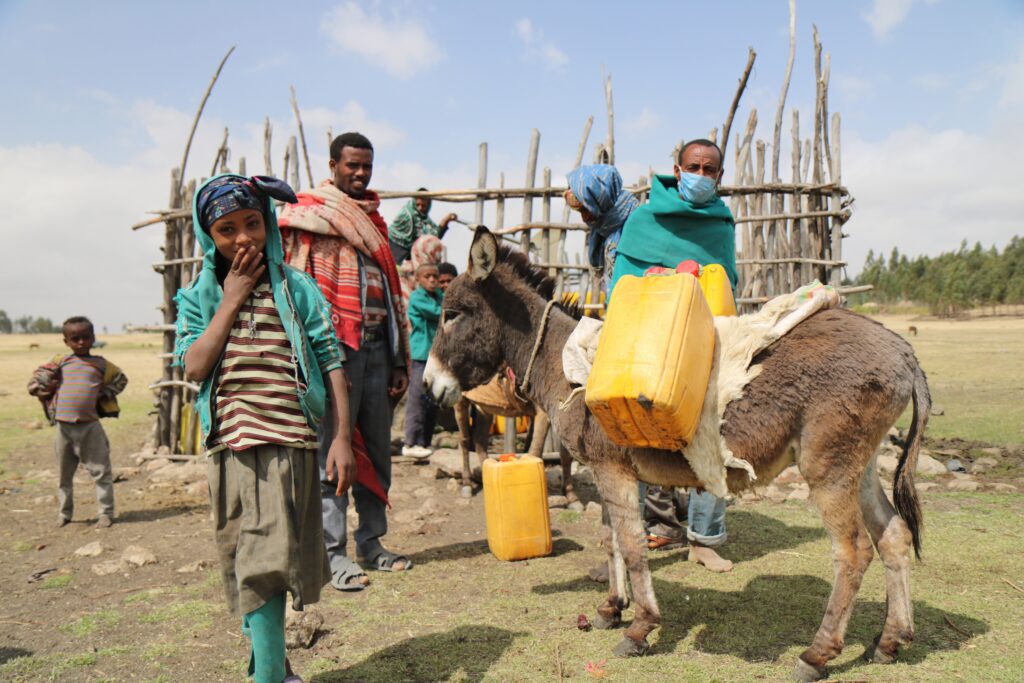
A young girl fetches water from a village well. She is about the same age as Tegene’s daughter was at the reconciliation five years after her father was murdered. Both communities use this well to collect water for their families.
The shimageles returned to the priests who were waiting by the stream, and delivered the answer. After months of painful meetings and negotiations, under a sky that promised the blessing of rain after a long dry season, the formal reconciliation could begin.
The priests began a low, sad chant that was taken up by the offenders’ families as the two sides moved closer together. A red lamb nibbled at a green patch near the waterway, oblivious of the role it was to play in ending the blood feud between these two communities; the Ethiopian Orthodox Tewahedo Church, adherents of Old Testament law, would call upon the ancient tradition of sacrifice to seal the covenant between these two groups.
The convicted men’s families carried stones on their shoulders, symbolizing the weight of the murder their children had committed. When they sat down by the water’s edge, members of the victim’s family took the stones and placed them on the ground, symbolically removing their guilt.
The lamb was sacrificed next to the stream. An elder from the offender’s family held the animal still while an elder from the victim’s family killed it quickly with a sharp scythe. Representatives from the offender’s family brought huge loaves of crusty bread, difo dabo, to the victim’s side of the stream, where they were cut into squares and passed out to everyone. Tala—beer made from barley—arrived, and bread and drink were shared, a communion of reconciliation.
Only then could the offenders’ families cross the stream to join the others. Friends long separated mingled on the hillside, catching up on the past five years.
The reconciliation was not only symbolic but also formally recorded by the government officials and the village elders. The county Peace and People Security Office would deliver the signed letter to the Debre Birhan prison officials. The agreement was formalized and could not be broken.
The two murderers had officially been forgiven. In time, they would be released from prison. Their community had granted them safe passage back home.
⸻
In the time since Rose Shenk and Bruce Buckwalter left Ethiopia in 2021 and the new MCC Representatives Paul and Rebecca Mosley started their term, Ethiopia has experienced the trauma of a civil war as well as increased ethnic tension and unrest across the country. Acts of reconciliation and restoration are needed now more than ever. MCC Ethiopia continues to work closely with the Meserete Kristos Church to bring relief and reconciliation in very difficult times.
Born in Nairobi Kenya to missionary parents, Rosemary Shenk spent the first thirteen years of her life in Tanzania and Kenya. She returned to East Africa as an adult with her husband, Bruce Buckwalter, to live and work in Kenya and Ethiopia. Bruce and Rose spent five years (2026–2021) as co-country representatives in Ethiopia for Mennonite Central Committee (MCC).
During their MCC term, Rose developed a short story for children set in the vibrant streets of Addis Ababa. It began with interactions or conversations Rose had with children who lived without homes and parents and who begged from cars at Meskel Square. Over time, it grew into a carefully researched story about a boy, his dog, and the other animals they encounter in the city streets. The book is beautifully illustrated with original photo collage and watercolor pictures by Ethiopian artist Abiy Eshete. Watch Out, Woosha! was published in November and is available from Amazon at https://a.co/d/gpk1msO.
This photo essay was originally posted in “Mystery and Wonder—the Journey Continued,” Rosemary’s blog about living in Addis Ababa and working for MCC Ethiopia. See https://buckshefusethiopia.wordpress.com/.
All photos by the author.
